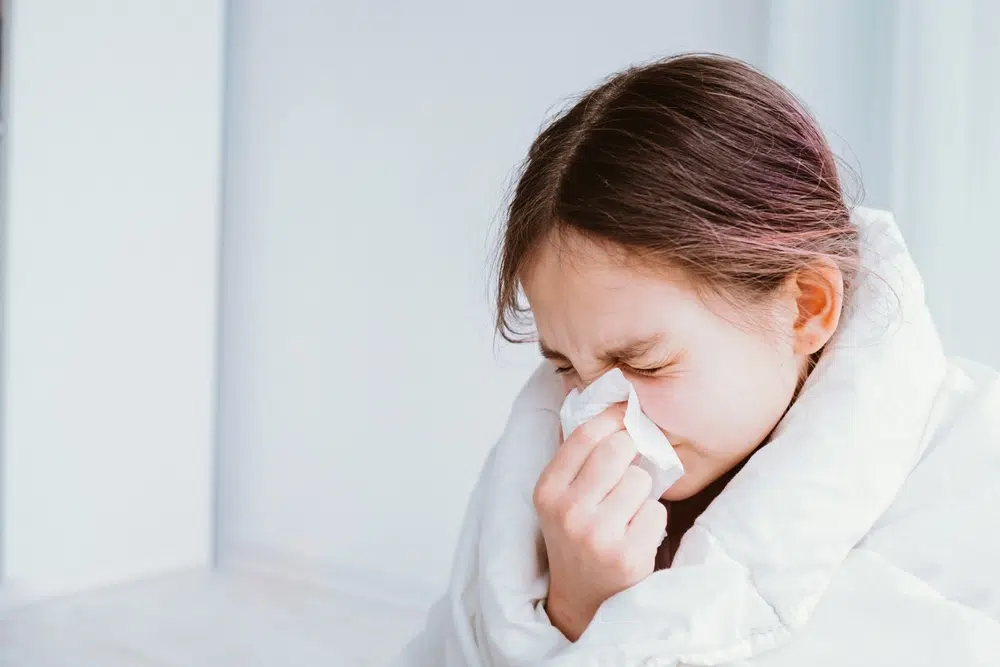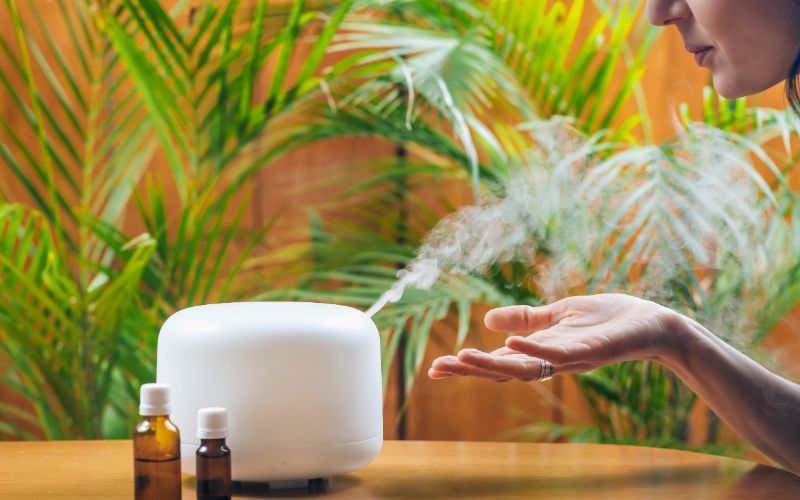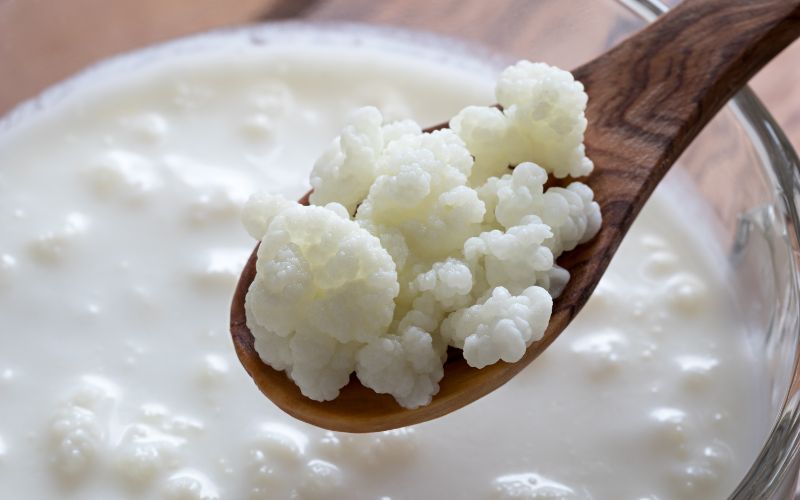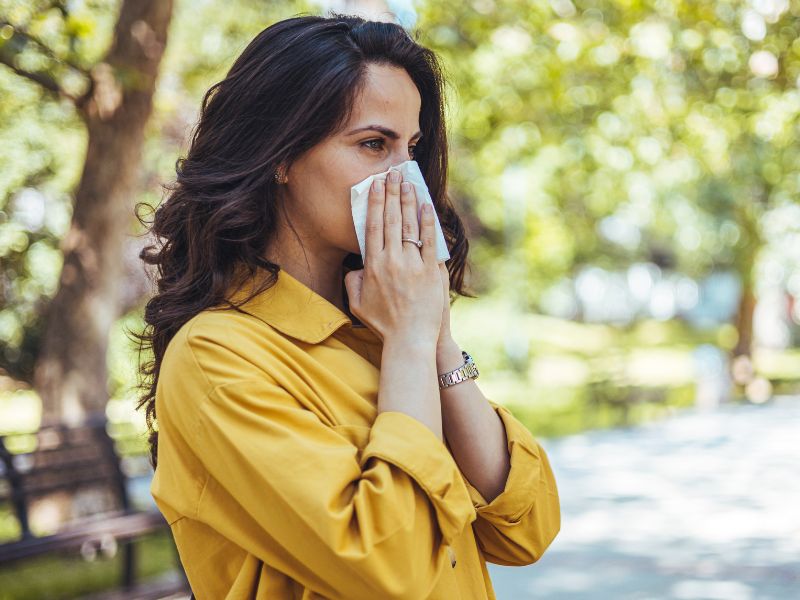Runny nose and sneezing caused by allergic rhinitis can be uncomfortable, but there are simple ways to manage these symptoms at home. Allergic rhinitis happens when your immune system reacts to allergens like pollen, dust, or pet dander, leading to irritation and congestion. With the right steps, you can find relief and reduce the impact on your daily life.
At Penn Medicine Becker ENT & Allergy, we focus on helping you manage these issues effectively. From simple remedies you can try at home to lifestyle changes that reduce your exposure to triggers, our team is here to provide solutions.

Simple Tips for Managing a Runny Nose and Sneezing at Home
- Home remedies like steam inhalation, saline nasal rinses, and herbal teas can provide relief from allergic rhinitis symptoms.
- Using essential oils like peppermint or eucalyptus may help ease nasal congestion caused by allergic rhinitis.
- Prevent allergic rhinitis by avoiding allergens, maintaining a clean home, and following a healthy lifestyle.
- Seek medical advice if home remedies and over-the-counter treatments do not improve allergic rhinitis symptoms.
So What is Allergic Rhinitis?
Allergic rhinitis is an inflammation that affects the nasal passages and mucous membranes, causing symptoms such as runny nose, stuffy nose, nasal congestion, itchy nose, and postnasal drip. The difference between sinusitis and rhinitis is that this last one occurs when the immune system overreacts to allergens like pollen from trees, grass pollen, dust mites, and animal dander while chronic sinusitis is caused by infections. This overreaction leads to the release of inflammatory cells, such as histamine and mast cells, which cause swelling and irritation in the nasal mucosa.
The two primary types of rhinitis are perennial and seasonal. Seasonal allergies are triggered by environmental factors (outdoor allergens) like pollen from trees, grasses, and weeds. This type of rhinitis typically occurs during specific seasons, such as spring and fall, when outdoor mold spores and pollen counts are high. Perennial allergic rhinitis, on the other hand, is caused by indoor allergens like house dust mites, pet dander, and indoor mold, leading to year-round allergy symptoms.
Symptoms of Allergic Rhinitis:
Aside from getting regular allergy testing, there are signs you can check for in your body:
- Eye Symptoms: Allergic rhinitis often affects the eyes, leading to symptoms like itchy, watery, red, or swollen eyes.
- Throat and Ear Issues: Some people experience an itchy throat, chronic coughs, frequent throat clearing, or a bacterial infection in the ear. Ear fullness or popping and earaches are also possible.
- Fatigue and Sleep Disturbances: Allergic rhinitis can disrupt sleep, leading to fatigue and reduced concentration during the day.
- Headaches and Facial Pain: Due to nasal congestion, some individuals might experience sinus headaches or pain in the face.
- Smell and Taste Disorders: Nasal congestion and inflammation of your blood vessels can affect the sense of smell and, consequently, the sense of taste.
- Shortness of breath
Effective Home Remedies for Allergic Rhinitis
While there is no cure for allergic rhinitis, several home remedies can help alleviate its symptoms. Here are some effective allergic rhinitis treatments for managing allergic rhinitis:

Steam Inhalation
Steam inhalation can help soothe nasal passages, reduce inflammation, and alleviate common symptoms. The process of performing steam inhalation starts with filling a bowl with hot water. Then, add a few drops of essential oils, such as eucalyptus or peppermint. Place a towel over your head and lean over the bowl to inhale the steam for 10-15 minutes. Steam inhalation can be particularly helpful during allergy season when airborne pollen counts are high, and symptoms may be more severe.

Honey
Consuming local honey may help build immunity to exposure to pollen allergens, reducing your allergic reactions over time. This natural remedy can be particularly effective for individuals suffering from seasonal allergies, as it may help decrease the severity of your symptoms. Take one tablespoon of local, raw honey daily to help combat allergic rhinitis and improve your overall health.

Turmeric
Turmeric is a powerful anti-inflammatory and antioxidant spice that can help reduce inflammation of the nasal mucosa and alleviate symptoms of allergic rhinitis. To incorporate turmeric into your treatment plan, add a teaspoon of turmeric powder to a glass of warm milk and drink it daily. This natural remedy can be especially beneficial for individuals with nonallergic rhinitis or those experiencing common cold symptoms.

Probiotics
Probiotics, found in fermented foods like yogurt and kefir, can help strengthen the immune system and reduce allergic reactions. In addition, probiotics may help improve the overall quality of life for individuals with atopic diseases, such as allergic asthma and food allergies.

Saline Nasal Irrigation
Nasal saline irrigation is another effective home remedy for treating allergic rhinitis symptoms. To perform nasal saline irrigation, use a neti pot or a decongestant nasal spray bottle filled with a saline solution made of 1/4 teaspoon of non-iodized salt dissolved in 8 ounces of warm distilled water. Gently irrigate your nostrils with the saline solution once or twice a day to help alleviate symptoms.

Herbal Remedies for Rhinitis
Herbs like butterbur, quercetin, and stinging nettle can help reduce inflammation and alleviate symptoms of allergic and nonallergic rhinitis. Yarrow is a good option but is not recommended to use for more than 2 consecutive weeks. Consult a healthcare provider before taking herbal remedies and supplements to ensure they are safe and appropriate for your specific needs.
Top Essential Oils for Rhinitis Relief
Essential oils can alleviate allergic rhinitis symptoms and improve well-being. Top oils for relief include:
- Eucalyptus Oil: Relieves nasal congestion and reduces inflammation.
- Peppermint Oil: Alleviates nasal itching and irritation, and acts as a natural decongestant.
- Lavender Oil: Reduces allergy symptoms, soothes nasal passages, and promotes relaxation.
- Tea Tree Oil: Reduces allergens and alleviates nasal irritation and congestion.
- Lemon Oil: Boosts the immune system and reduces inflammation.
To use essential oils for rhinitis relief, add drops to a diffuser or humidifier, dilute with a carrier oil, and apply topically, or inhale directly from the bottle. Consult a healthcare provider before using essential oils, especially if you are pregnant, breastfeeding, or have pre-existing medical conditions.
Find Relief for Allergic Rhinitis
Schedule a consultation with Penn Medicine Becker ENT & Allergy for expert care and effective solutions to manage your symptoms.
How to Prevent Rhinitis
Preventing allergic rhinitis involves taking proactive steps to reduce your exposure to allergens and maintaining a healthy lifestyle. Here are some strategies to help prevent rhinitis:
Avoid Triggers
Identify the allergens that trigger your rhinitis symptoms and take measures to minimize your exposure to them. Some practical ways to avoid allergens include:

Maintain a Healthy Lifestyle
A strong immune system can help reduce the severity of allergic reactions. To maintain a healthy immune system, incorporate the following habits into your daily routine:
Diet and Nutrition
Diet plays a significant role in managing allergic rhinitis. Certain foods can exacerbate symptoms, while others may offer relief. Incorporating foods rich in omega-3 fatty acids, like fish and flaxseed, can reduce inflammation. Probiotics found in yogurt and fermented foods may improve immune function.
On the other hand, dairy products might increase mucus production, potentially worsening symptoms. A balanced diet, rich in fruits and vegetables, provides essential vitamins and antioxidants that can support overall health and potentially reduce allergic reactions. Always consult with a healthcare provider for personalized dietary advice.
Allergic Rhinitis Medications: Expanding Your Treatment Options
- Antihistamines (Oral and Nasal): Broaden on oral and nasal antihistamines, explaining how they block histamine, a chemical released during an allergic reaction. Mention commonly prescribed antihistamines and discuss potential side effects, such as drowsiness.
- Decongestants (Oral and Nasal): Elaborate on how decongestants shrink swollen nasal passages for easier breathing. Caution against prolonged use due to the risk of rebound congestion.
- Corticosteroid Nasal Sprays: Dive deeper into the action mechanism of nasal corticosteroids in reducing inflammation and their long-term efficacy. Highlight the importance of correct usage of this form of nasal spray for maximum benefit.
- Leukotriene Modifiers: Introduce this less commonly used medication, which blocks leukotrienes, another chemical that contributes to allergic reactions. Discuss their role, particularly for those who can’t tolerate antihistamines or nasal corticosteroids.
- Immunotherapy: Explain allergen immunotherapy, which gradually builds tolerance to allergens. Detail the two forms: allergy shots and sublingual tablets.
- Combination Therapies: Discuss the potential benefits and considerations of combining different types of medications for more effective symptom control.
When to See a Doctor for Rhinitis
While home remedies and over-the-counter medications can help alleviate common symptoms of allergic rhinitis, it is crucial to consult a healthcare provider in certain situations. These may include:
- Persistent or worsening symptoms despite trying home remedies, oral antihistamines, and oral decongestants
- Severe symptoms that interfere with your daily activities or cause shortness of breath
- Frequent occurrences of sinus infections, middle ear infections, or exacerbations of asthma symptoms or other medical conditions
A healthcare provider can perform a physical examination to evaluate potential nasal polyps, assess the severity of your symptoms, and differentiate between allergic and non-allergic rhinitis. They may also recommend appropriate treatment options, such as nasal steroids, intranasal antihistamines, or allergen immunotherapy (allergy shots), to help manage your symptoms more effectively.
Why Trust Penn Medicine Becker ENT & Allergy?
Trying to manage sneezing and a runny nose on your own can be frustrating, especially when allergy symptoms just won’t let up. At Penn Medicine Becker ENT & Allergy, we understand how disruptive allergic rhinitis can be, and we’re here to help you find lasting relief.
Our allergy specialists offer advanced testing to pinpoint exactly what’s triggering your symptoms, and we build personalized treatment plans that go beyond just masking the problem. Whether you’ve tried every over-the-counter option or you’re just starting to connect the dots between your symptoms and allergies, we’re ready with expert answers.
Here’s why patients turn to us:
- Precise allergy testing to identify your triggers
- Custom treatment plans, including immunotherapy (allergy shots or drops)
- 17+ locations in NJ and PA for convenient, expert care close to home
- Support for both kids and adults dealing with chronic nasal symptoms
Home remedies can help—but when you need more than tissues and antihistamines, we’re here with real solutions.

